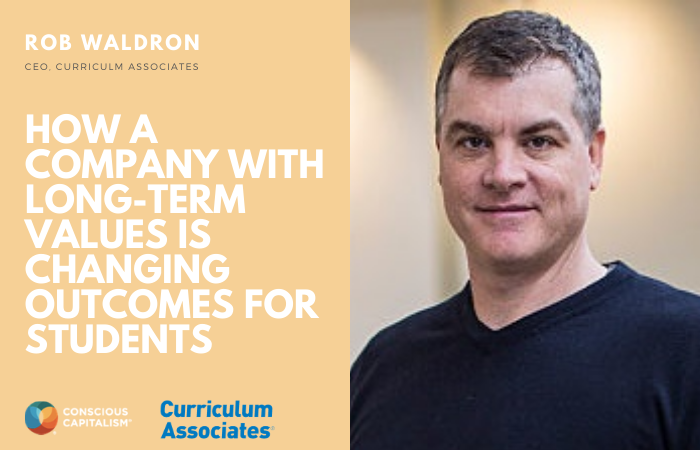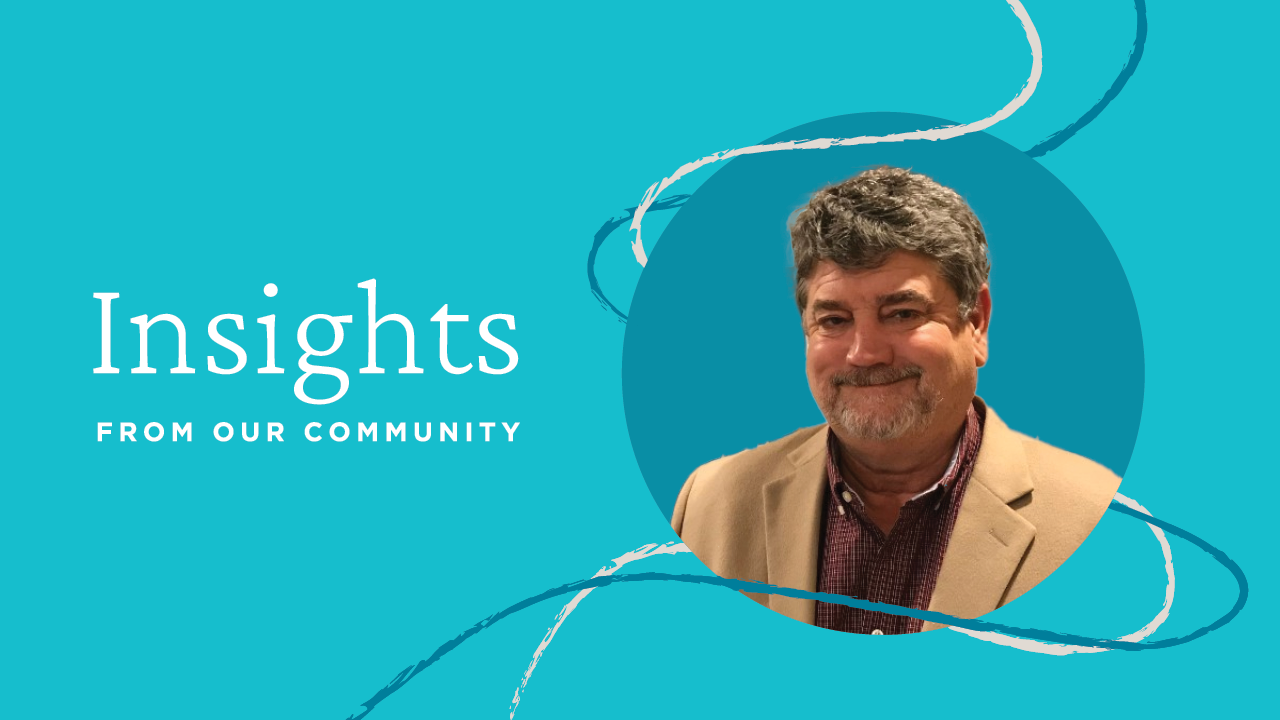
Rob Waldron has always approached business with a social lens. During his early career, he worked at Morgan Stanley and volunteered at a NYC homeless shelter during the crack epidemic. Seeing this juxtaposition of worlds inspired him to look differently at traditionally-defined business success. His career has been driven by the belief that companies who do “well” financially will do best when they also serve the communities in which they operate. His search for a conscious company led him to become CEO of Curriculum Associates in 2008. Rob believes in putting people over profits and treating his employees with grace. The impact of Rob’s many socially-focused corporate initiatives include voluntarily raising the minimum wage to $15/hour and working to “give away” the company to charity with a historic $200M gift. Rob also believes in hiring people, not positions, and spends over 50% of his time recruiting and hiring top talent. In addition, to ensure he lives up his Conscious Leadership standards, Rob welcomes feedback by inviting every employee to participate anonymously in his annual review. In the spirit of transparency, he then reports out all the results to the entire company. He feels the role of an education company is to help students and teachers succeed, and as a result of his conscious focus, employees at every level are committed to making a true difference in education.
Today, Rob Waldron is CEO of Curriculum Associates, a leading educational technology and publishing company serving approximately 10 million K-12 students and more than 400,000 teachers across the country. But, at 23 years old, Rob was on a very different path. He was working at Morgan Stanley and building a promising career in finance when his career path took a turn. He was volunteering his free time just a few blocks away from his office on Wall Street at Covenant House, a crisis center for children, where he was struck by the number of homeless children he encountered there. These children had no homes, no food, and no supports to help lift them out of poverty. He saw the disparity between his professional world and the reality these children faced, and he felt that there had to be a way to apply good business practices to address urgent social needs. With this conviction at heart, Rob left Wall Street and entered business school with the intention of finding a business solution to the issue of inequity.
After graduating from Harvard Business School, Rob spent nearly a decade working in the education space in both for-profit and nonprofit organizations. When seeking a new leadership opportunity with a mission-driven organization that directly impacted children, he was introduced in 2008 to educational publishing pioneer Frank Ferguson, the co-founder and President of Curriculum Associates, Inc. After several months, Frank, who was 81 at the time, determined he had found a worthy successor to uphold the company’s values and service in Rob.
Rob knew he was inheriting a great responsibility. Curriculum Associates’ Higher Purpose was to help all students grow through equitable learning experiences. This company was not only Frank’s life’swork; it was the “dream job” Rob had been seeking, the embodiment of his calling to support a more just world through education. He joined the company as CEO in 2008, with Frank staying on as chairman emeritus until his passing in January 2021 at age 94, leaving behind an incredible legacy.
Like many people, Rob was willing to do almost anything for his dream job. As it turned out, his will was quickly put to the test.
The long-term contract
Shortly after taking over as CEO of Curriculum Associates, Rob was introduced to a concept that would impact his life, his company, his team, and millions of students and educators for the next 20 years and beyond: a unique long-term contract.
I’ve been told I’m the only Harvard Business School graduate ever to sign a 20 year employment contract. And, to be honest, it was one of the greatest gifts of my life.
He tells us, “I had all the normal employment contracts in place: in the first year I can get fired for any reason, after that there is the typical 5 year vest with my equity, and so on. At first, everything seemed pretty standard. Suddenly, I’m 9 months into my role when Frank approaches me and says, ‘You know, if you leave voluntarily before you retire, you get nothing.’ I was shocked and confused. I said, ‘That’s absurd! No one in America does that, Frank!’ I almost quit. Then I talked to a friend who reminded me that this is my dream job and maybe I should think more about it before making a rash decision. I did, and—astonishingly—I made the decision to stay. Frank and I worked together on the details, and we agreed on the terms. I’ve been told that I’m the only Harvard Business School graduate ever to sign an employment contract with 20 year terms. And, to be honest, it was one of the greatest gifts of my life.”
The long-term contract made it possible for Rob and his team to think beyond short-term returns, and this made a crucial difference in his leadership. He tells us, “We were freed up to focus on what really matters, which is delivering great results for students and teachers. Our growth in the years since is a testament to the fact that every measure of business success falls into place if you’re great at delivering on that commitment.”
Building a stakeholder culture aligned with the long-term contract
This won’t come as a surprise to many Conscious Capitalists, but the long-term approach has proven itself as a strategy that delivers exceptional value to all of Curriculum Associates’ stakeholders—the schools, the team, and even investors.
Curriculum Associates has managed to build a stakeholder culture founded on its long-term approach to success in two ways:
First, Rob tells us, “We think—all the time—about what is best for teachers and students and we do that first. If we deliver great outcomes for them, shareholders will be taken care of.”
Second, they ensure all of their stakeholders are aligned on the company’s long-term timeline. Rob explains, “If I’m an investor with a 1 year timeline, and you have a 9 year timeline, there will be misalignment. If all the stakeholders are aligned on time, then reputation is the most important thing, and our programs and services bear fruit over time because of their high quality.”
Below are some examples of how the long-term approach works with some of Curriculum Associates’ key stakeholders.
Schools. When you take a long-term approach, you build trust with your stakeholders. Rob explains how this relationship can withstand the most turbulent of times, noting, “Even amid the COVID-19 crisis, our long-term approach was only reinforced. In a time of distress, people called on their most trusted partner for help. Because we weren’t doing anything short-term,and we had earned their trust over time, we were called on more in this crisis than I would have imagined possible. It took us nearly 9 years to get to 8 million students, and this spring we added a million new kids to our platform in just 4 weeks.” Employees. Curriculum Associates boasts a low 8% employee turnover rate, which when you do the math, means that, on average, their employees stay with the company for 12 years. Rob explains, “One of the reasons we work hard to be a strong employer is it leads to low turnover. We want to have people who are invested in staying here for a long time and who come here for a career rather than a quick journey; that changes their frame of reference.” The company has won numerous awards for their culture, including being named to the Boston Globe’s Top Places to Work seven years in a row. Rob and his team work hard to create conditions at work that build careers, not jobs. They do this by focusing on three areas:
- Be laser-focused on who your people are. It’s about 3 times as hard to get a job at Curriculum Associates than it is to get into MIT. There is good reason for this level of selectivity. Beyond having the skills and experience to do the work, Rob tells us, “The real thing that I look for is, Will they love what we do? We want to hire happy people who are going to be driven by our mission and deeply engaged with the work they do here.”
- Give your people a voice. Rob and his team meet regularly to ensure that they are exceeding standards by paying their team well, offering competitive benefits, and—perhaps most importantly—giving their people a voice. Rob explains, “We have decentralized decision-making so the smart people that we work so hard to hire have the opportunity to share their invaluable input. I think executives are overrated. All of our people matter; they are the ones creating value for educators and students.”
- Live by a common set of values. Contrary to popular belief, Rob and his team don’t seek to create a common culture. He tells us, “People like to talk about our great culture, but culture isn’t always the same depending on the department you work in. For example, the folks on our tech team have a different culture than the folks on our warehouse team. Instead, we share a common set of values. For example, we have a value “Say it like it is – with grace” so when someone is expressing a dissenting opinion respectfully, including me, it’s valued and rewarded, even if they don’t get their way. One of the ways in which we teach about this value is by using the Space Shuttle Challenger disaster as an example. After the event, it was discovered that several NASA scientists were concerned about the safety of the launch, but no one spoke up. We provide our employees with a safe space to speak up, and their valuable feedback can help eliminate potential issues down the line.”
Investors. You can’t always expect your investors to share a common set of values, but you can seek to find growth-oriented investors who want to help build a world-class organization that will make a difference in the world. Rob tells us how he was able to be sure that this was the case for one of the investors he was considering working with. As part of his own due diligence, he shared, “I called every CEO that the investor had ever worked with over the last decade. I wanted to hear firsthand that they were truly committed to building a great company and had long-term thinking – only then did I choose them.” But growth-orientation is just the start. Rob makes sure that the company’s financial partners understand his priorities. He tells us, “When meeting with investors recently, I told them, “‘I don’t wake up every morning excited about EBITDA. You’re like electricity, something we need and use, but not the heart of what makes our company tick or drives our mission. I believe that if we continue to focus on delivering greatness for schools, you’re going to love being in this relationship. This is my life’s work. We respect and appreciate you, but making gains for you isn’t what excites me. Are you cool with that? Because otherwise, I’m the wrong guy.” [For the record— they were cool with that.]



